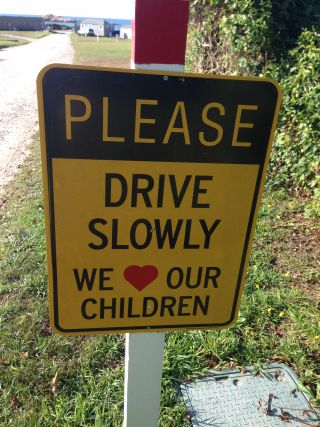Relationships
Build a Better Family Than the Abusive One You Grew Up In
Guidelines to help you parent your children with love and respect
Posted August 18, 2014

Last month, while on vacation, my five-year-old grandson and I were strolling down a gravel path and came upon a yellow road sign with a red heart on it and black letters which read: PLEASE DRIVE SLOWLY. WE LOVE OUR CHILDREN. He asked me to read it to him and afterwards took a deep breath and smiled a big smile at me. "I really like it here, Grandma," he said. "The people love their children." That is exactly how children growing up in healthy families feel. Their home environment is safe, stable, and nurturing. On the other hand, children who are subjected to abuse are injured, and deprived of these basic human needs. Most grow up determined to never treat their own children the way they were treated. Research indicates however that 1 in 3 people who were abused as children will grow up to abuse their own (www.Helpguide.org). Here are some quidelines to help you break the intergenerational cycle of abuse and raise your children with love and respect:
1. Learn some basics about child development, so that you can understand what's age-appropriate and what's not and so that you can gain an understanding of how to support your child's healthy development.
2. Take good care of yourself. Get enough rest, ask for support when you're overwhelmed, and get a break from the children when you need it. If you have a mental illness or problems with alcohol or drugs it is essential that getting into treatment be your first prioroty. Even if those are not concerns for you, it's still important for you to learn how to manage your emotions, and remember that your background might make you particularly vulnerable to some stresses. Beverly Engel has written a book that may be quite helpful for you and your partner to read: Breaking the Cycle of Abuse: How to Move Beyond Your Past to Create an Abuse-Free Future (www.wiley.com)
3. Develop good parenting skills. There are many ways to do this, such as attending parenting classes or seminars, reading books, and turning to other parents for tips and advice.
4.Common sense would tell us what the October, 2013 issue of the Journal of Adolescent Health reports - that a supportive, trusting relationship with an intimate partner along with high levels of maternal warmth between a mother and and her children are important factors associated with the absence of child abuse. Research done by John Gottman, Ph.D.at the Relationhip Research Institute in Seattle highlights how important the tone of the father's relationship with the child is also. His book, And Baby Makes Three is very good for couples who are experiencing the transition to parenthood, as are the research-based couples workshops named Bringing Baby Home, which he and his wife developed (www.gottman.com).
5.Get professional help - individual, marital, or family therapy - if you're having trouble with any of these areas. Marital therapy can strenghten the emotional tone of your marraige and also be a good place to get parenting advice.
6. Develop relationships with couples who have healthy marriages and are also dedicated to being good parents.
7. Keep a gratitude journal. Research has indicated that people who do so are happier, more optimistic, and healthier.
Note: If you're a parent who is tempted to abuse your child, call 1-800-4-A-CHILD for help
Sources of material in this blog not mentioned above include the CDC website: www.cdc.gov and this article:: www.time.com/90954/mothers-day-parentling-skills/
.


